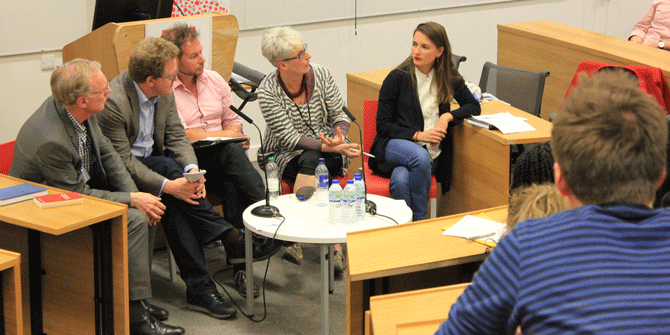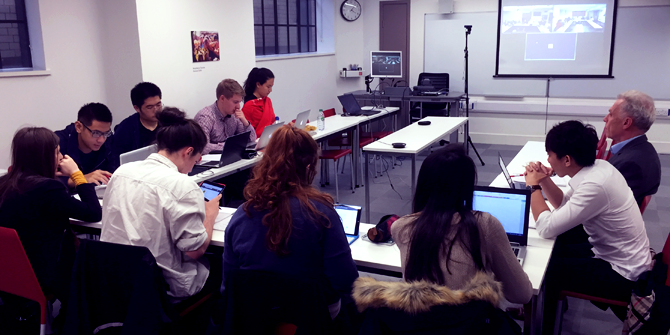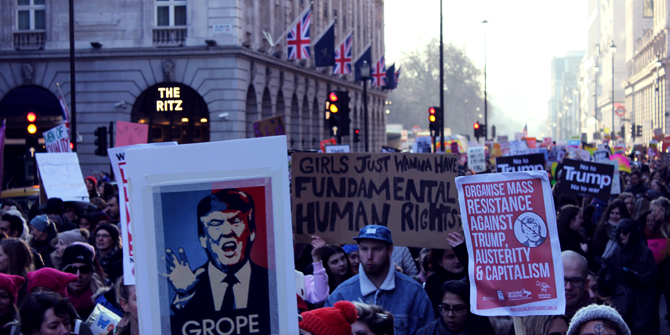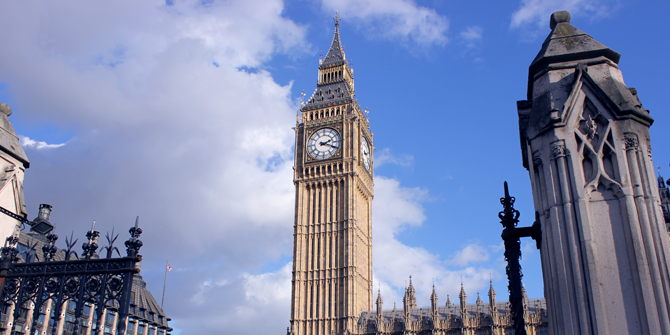Julien Dumont explores ‘The Other Neoliberalism: German ordoliberalism after the Euro crisis’, following on from the public lecture held at LSE on Thursday 10 May.
Ordoliberalism has garnered attention of late with developments surrounding the Eurozone crisis, most notably in terms of Germany’s response. Now perceived in some quarters as an influential doctrine in European politics, the ordo-liberal tradition began as a rather parochial German affair. First developed around and during the Second World War, Ordoliberalism grew out of the work of economists and legal theorists associated with the Freiburg School, such as Walter Eucken and Franz Böhm. At its core, the ordo-liberal tradition converges around the idea of an economic constitution. Recognising the contingencies borne out of the free market, ordoliberals are committed to robust state intervention in the form of a concrete set of rules directing socio-economic activity. In this respect they are easily distinguishable from neoliberals, with whom they share an embrace of the market economy. Amongst their policy prescriptions, ordoliberals give a central importance to price stability, an intelligible commitment in light of the deep social, economic and political trauma of the Weimar and Nazi era.
Widely seen as constitutive to the economic policy of post-war West Germany, Ordoliberalism carried a deep currency in the Adenauer administration, not least with the tenure of future Chancellor Ludwig Erhard, then Minister of Economics. The German Wirtschaftswunder, or economic miracle, was quickly associated with ordoliberal prescriptions. More recently, ordoliberalism has come to be linked with German attitudes to, and management of, the European sovereign-debt crisis. The insistence on an obligation for strict budgetary commitments and fiscal responsibility have been traced to the ordoliberal spirit. It is in this context that a number of contributors, amongst which all four speakers on the panel, have explored ordoliberalism both in terms of its intellectual development and impact on today’s politics in the recent volume edited by Josef Hien and Christian Joerges: Ordoliberalism, Law and the Rule of Economics.
The first speaker, Associate Professor David Woodruff of the LSE’s Department of Government, began by drawing parallels between the central theses of ordoliberalism and the work of Karl Polanyi, the Austro-Hungarian economic anthropologist. Both he suggested, had been concerned with the destructive consequences of a mismanaged laissez-faire economy, namely the rise of fascism. However, where Polanyi identified laissez-faire itself as the root of the problem, the ordoliberals focused on its management, with a specific focus on the price mechanism. From this, Professor Woodruff holds, stemmed a will to constrain state intervention in limiting the supply of uncompetitive policies, with a view to mould and fix a morally appropriate market order.
Interestingly, the second speaker, Professor Albert Weale of UCL, focused on the particulars of these policy prescriptions in their historical context. Looking at the work of economic historians, Professor Weale narrowed down on the important role played by corporatist groups in, counterintuitively to ordoliberal cannon, making a success of German ordoliberalism. Specifically, he explained the crucial impact of unions in effecting wage restraint in Germany, a decisive factor in gaining a competitive edge. This, he suggests, indicates the reliance on good sense amongst all socio-economic actors for ordoliberal policies to flourish, a factor found lacking at the European level, which accounts at least partially for the current contentiousness of the ordoliberal tradition.
Professor Michelle Everson of Birkbeck, University of London, provided a more macroscopic take on the role and meaning of ordoliberalism. In her view, it represents a bridge between law and economics. She suggests ordoliberalism entails a rejection of the economy as an objectively knowable material reality, with an implicit dismissal of scientism and socialism as chimeras. This viewpoint consequently distinguishes ordoliberalism from all those claiming to know how to ‘do’ the economy, including those of the ilk of the Davos elite.
In the final intervention, Professor Jonathan White, of the LSE’s European Institute, gave a view of ordoliberalism in connection with political agency and the politics of emergency. Here, the point was made that when ordoliberals offer an injunction to constrain economic activity, they do so by limiting political discretion on economic matters. Following the idea of an economic constitution, the moment of agency is located in the past, whereby a foundational decision has been made in favour of a specific (ordoliberal) type of market economy. Professor White further focused on the complications that arise with contingent situations requiring a greater level of discretion than is allowed. The argument was put forward that, perhaps unexpectedly, ordoliberalism is equipped to deal with such challenges by resorting to the notion of exceptionality. Accordingly, the necessary discretion can be achieved by resorting to reasons internal to ordoliberalism, justifying the suspension of normalcy. Here the affinity between binding rules on one side and the politics of emergency on the other is made clear, and affinity which Professor White purports is typical of the ordoliberal spirit, as well as of the political response to the Eurozone crisis. The EU’s fiscal compact for instance can be seen as a foundational act of political discretion, justified by a necessity threshold and establishing a new set of rules, with the stated intent to avert future such manifestations of political agency. Interestingly, Professor White concluded by drawing a disanalogy between this aspect of ordoliberalism and the contemporary populist phenomenon, characterising the latter as the politics of volition par excellence, with the promise of unlimited political discretion a key source of its appeal.
These four interventions conjure a more complex image of ordoliberalism than is sometimes allowed. Rather than serving as the definite economic doctrine of the German dominated Eurozone, ordoliberalism appears instead as an important reference point, as a constituent part in the language of justification deployed in Eurozone politics.
 Julien Dumont is an MSc student in political theory at the LSE’s Department of Government.
Julien Dumont is an MSc student in political theory at the LSE’s Department of Government.
Note: this article gives the views of the author, and not the position of the LSE Department of Government, nor of the London School of Economics.






